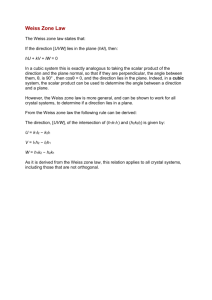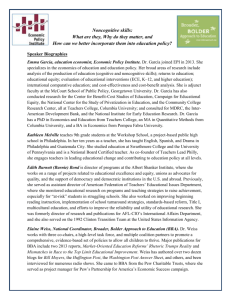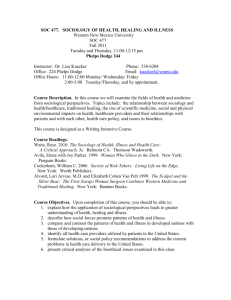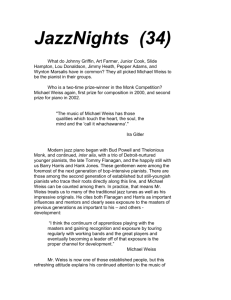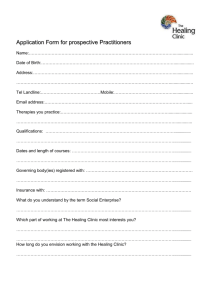sociology of health, healing and illness
advertisement
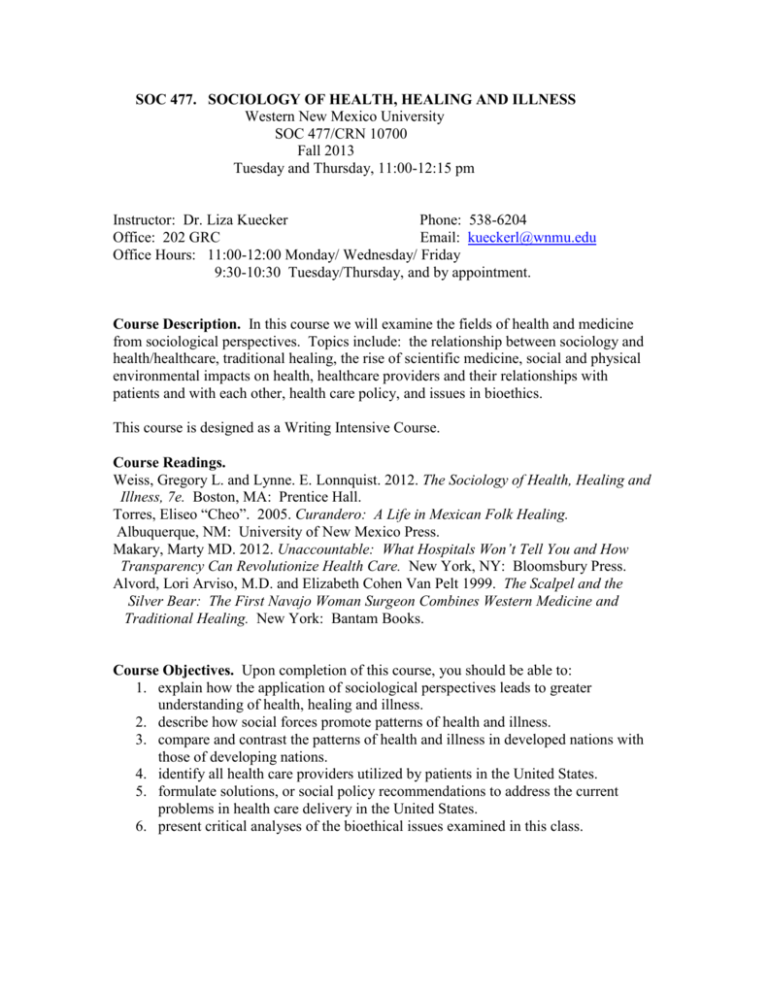
SOC 477. SOCIOLOGY OF HEALTH, HEALING AND ILLNESS Western New Mexico University SOC 477/CRN 10700 Fall 2013 Tuesday and Thursday, 11:00-12:15 pm Instructor: Dr. Liza Kuecker Phone: 538-6204 Office: 202 GRC Email: kueckerl@wnmu.edu Office Hours: 11:00-12:00 Monday/ Wednesday/ Friday 9:30-10:30 Tuesday/Thursday, and by appointment. Course Description. In this course we will examine the fields of health and medicine from sociological perspectives. Topics include: the relationship between sociology and health/healthcare, traditional healing, the rise of scientific medicine, social and physical environmental impacts on health, healthcare providers and their relationships with patients and with each other, health care policy, and issues in bioethics. This course is designed as a Writing Intensive Course. Course Readings. Weiss, Gregory L. and Lynne. E. Lonnquist. 2012. The Sociology of Health, Healing and Illness, 7e. Boston, MA: Prentice Hall. Torres, Eliseo “Cheo”. 2005. Curandero: A Life in Mexican Folk Healing. Albuquerque, NM: University of New Mexico Press. Makary, Marty MD. 2012. Unaccountable: What Hospitals Won’t Tell You and How Transparency Can Revolutionize Health Care. New York, NY: Bloomsbury Press. Alvord, Lori Arviso, M.D. and Elizabeth Cohen Van Pelt 1999. The Scalpel and the Silver Bear: The First Navajo Woman Surgeon Combines Western Medicine and Traditional Healing. New York: Bantam Books. Course Objectives. Upon completion of this course, you should be able to: 1. explain how the application of sociological perspectives leads to greater understanding of health, healing and illness. 2. describe how social forces promote patterns of health and illness. 3. compare and contrast the patterns of health and illness in developed nations with those of developing nations. 4. identify all health care providers utilized by patients in the United States. 5. formulate solutions, or social policy recommendations to address the current problems in health care delivery in the United States. 6. present critical analyses of the bioethical issues examined in this class. Instructional Methods and Attendance Policy: In teaching this course, there will be lecture, but more time will be devoted to class discussion. Come to class prepared to discuss the assigned reading for that day. Attendance is important as the participation of everyone is critical to the success of the course. You learn from the instructor and your peers. Cell phones are to be off and put away during class. Lecture will include material that will supplement the reading, so it is important to take notes. If you miss a class, it is your responsibility to get copies of handouts and lecture notes. You are permitted a maximum of three absences, for whatever reason. More than three absences may result in being dropped from the class. Communication Policy Statement Regarding Official Email: WNMU’s policy requires that all official communication-including changes in assignments and gradeswill be sent to your wnmu.edu email address. It is very important that you access your Mustang Express email periodically to check correspondence from the University. If you receive most of your email at a different address, you can forward your messages from Mustang Express to your other address. Disability Services at Western New Mexico University: Services for students with disabilities are provided through the Disability Services Office, located in the Juan Chacon Building. Some examples of the assistance provided are: audio materials for the blind or dyslexic, note takers, readers, campus guides, audio recorders, a quiet testing area, and undergraduate academic tutors. In order to qualify for these services, documentation must be provided by qualified professionals on an annual basis, Disability Services forms are available in the Academic Support Center. The Disability Services Office, in conjunction with the Academic Support Center, serves as Western New Mexico University’s liaison for students with disabilities. The Disability Services Office can be contacted by phone at 575.538.6400 or email at atdss@wnmu.edu. Evaluation Criteria: Two essay examinations, take home format. 50% Two book critiques 30% Disability project 10% Attendance and participation 10% The exams, book critiques and other course assignments are due on the dates specified. I will not accept late work unless there are extenuating circumstances. Grading Scale: Students who earn 90% of the total possible points will receive the grade of “A”; 80% of total possible points will earn a “B”. 70% a “C” and so forth. Academic Integrity Policy and Procedures: Each student shall observe standards of honesty and integrity in academic work as defined in the WNMU catalog. Violations of academic integrity include “any behavior that misrepresents or falsifies a student’s knowledge, skills or ability with the goal of unjustified or illegitimate evaluation or gain” (WNMU Faculty Handbook, 2008). Generally violations of the academic integrity include cheating and plagiarism. Refer to the Student Catalog pages 60-61 for definitions. Any cheating or plagiarism on course requirements will result in a 0 for that particular assignment. Course Outline. I reserve the right to amend the course schedule to meet the needs of the class. Week One August 20-22 Introduction to the Course: What is Medical Sociology? The Development of Scientific Medicine Weiss and Lonnquist, Chapters 1-2 Week Two August 27-29 Social Epidemiology Society, Disease and Illness Weiss and Lonnquist, Chapters 3-4 Video: AIDs in Africa Week Three September 3-5 The Social Distribution of Illness in the United States Readings: TBA Week 4 September 10-12 Social Stress-Are You Experiencing It? Weiss and Lonnquist, Chapter 5 Week 5 September 17-19 Health Behavior and Risk Taking Behavior Weiss and Lonnquist, Chapter 6 Week 6 September 24-26 Experiencing Illness and Disabilities Weiss and Lonnquist Chapter 7 The Disability Project Week 7 October 1-3 Sociology of Mental Illness Video: The Medicated Child Exam #1. Distributed and explained on Thursday, October 3. Week 8 October 8-10 Physicians and the Profession of Medicine Weiss and Lonnquist, Chapters 8,12 Also, be reading The Scalpel and the Silver Bear Exam #1. Due on Thursday, October 10 Week 9 October 15-17 Medical Education and the Socialization of Physicians Weiss and Lonnquist, Chapter 9 Discussion of The Scalpel and the Silver Bear Book Critique Due: Thursday, October 17. Week 10 October 22-24 Nurses, Mid-level Health Care Practitioners and Allied Health Workers Weiss and Lonnquist, Chapter 10 Also, be reading Curandero: A Life in Mexican Folk Healing Week 11 October 29-31 Complementary and Alternative Medicine Weiss and Lonnquist, Chapter 11 Discussion of Curandero: A Life in Mexican Folk Healing Book Critique Due: Thursday, October 31. Weeks 12-13 November 5-14 The Health Care System in the United States Health Care Delivery Chapters 14,15 Also be reading Unaccountable: What Hospitals Won’t Tell You and How Transparency Can Revolutionize Health Care. Book Critique Due: Thursday 19. Week 14 November 19-21 What Can We Learn From Health Care Systems in Other Countries? Weiss and Lonnquist, Chapter 17 Video: Sick Around the World Week 15 November 26-28 Thanksgiving Recess: No Classes This Week. Week 16 December 2-6 Bioethics and the Social Implications of Advanced Health Care Technology Weiss and Lonnquist, Chapters 13, 16. Exam #2. Distributed and explained on Tuesday, December 2. Final Exam Time: Wednesday, December 11th at 10 am.
